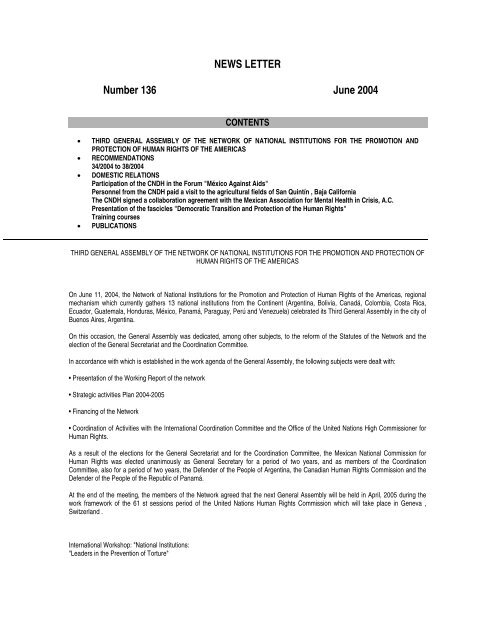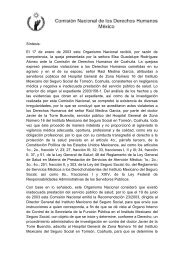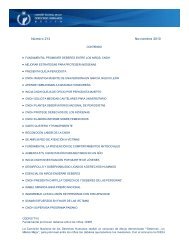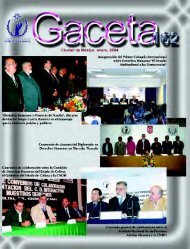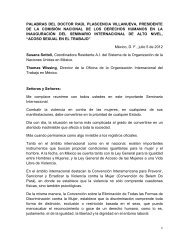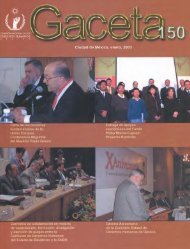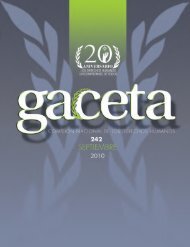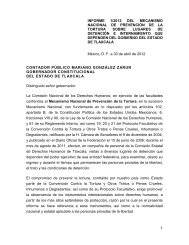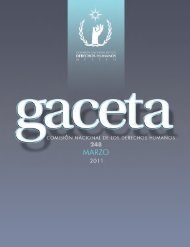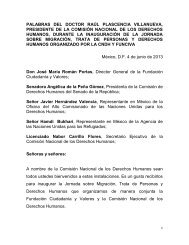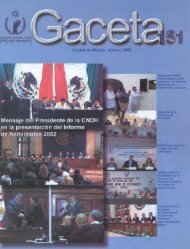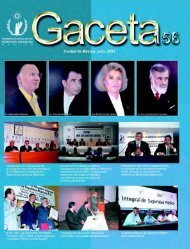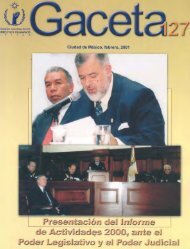CNDH. CARTA DE NOVEDADES
CNDH. CARTA DE NOVEDADES
CNDH. CARTA DE NOVEDADES
You also want an ePaper? Increase the reach of your titles
YUMPU automatically turns print PDFs into web optimized ePapers that Google loves.
NEWS LETTER<br />
Number 136 June 2004<br />
CONTENTS<br />
• THIRD GENERAL ASSEMBLY OF THE NETWORK OF NATIONAL INSTITUTIONS FOR THE PROMOTION AND<br />
PROTECTION OF HUMAN RIGHTS OF THE AMERICAS<br />
• RECOMMENDATIONS<br />
34/2004 to 38/2004<br />
• DOMESTIC RELATIONS<br />
Participation of the <strong>CNDH</strong> in the Forum "México Against Aids"<br />
Personnel from the <strong>CNDH</strong> paid a visit to the agricultural fields of San Quintín , Baja California<br />
The <strong>CNDH</strong> signed a collaboration agreement with the Mexican Association for Mental Health in Crisis, A.C.<br />
Presentation of the fascicles "Democratic Transition and Protection of the Human Rights"<br />
Training courses<br />
• PUBLICATIONS<br />
THIRD GENERAL ASSEMBLY OF THE NETWORK OF NATIONAL INSTITUTIONS FOR THE PROMOTION AND PROTECTION OF<br />
HUMAN RIGHTS OF THE AMERICAS<br />
On June 11, 2004, the Network of National Institutions for the Promotion and Protection of Human Rights of the Americas, regional<br />
mechanism which currently gathers 13 national institutions from the Continent (Argentina, Bolivia, Canadá, Colombia, Costa Rica,<br />
Ecuador, Guatemala, Honduras, México, Panamá, Paraguay, Perú and Venezuela) celebrated its Third General Assembly in the city of<br />
Buenos Aires, Argentina.<br />
On this occasion, the General Assembly was dedicated, among other subjects, to the reform of the Statutes of the Network and the<br />
election of the General Secretariat and the Coordination Committee.<br />
In accordance with which is established in the work agenda of the General Assembly, the following subjects were dealt with:<br />
• Presentation of the Working Report of the network<br />
• Strategic activities Plan 2004-2005<br />
• Financing of the Network<br />
• Coordination of Activities with the International Coordination Committee and the Office of the United Nations High Commissioner for<br />
Human Rights.<br />
As a result of the elections for the General Secretariat and for the Coordination Committee, the Mexican National Commission for<br />
Human Rights was elected unanimously as General Secretary for a period of two years, and as members of the Coordination<br />
Committee, also for a period of two years, the Defender of the People of Argentina, the Canadian Human Rights Commission and the<br />
Defender of the People of the Republic of Panamá.<br />
At the end of the meeting, the members of the Network agreed that the next General Assembly will be held in April, 2005 during the<br />
work framework of the 61 st sessions period of the United Nations Human Rights Commission which will take place in Geneva ,<br />
Switzerland .<br />
International Workshop: "National Institutions:<br />
"Leaders in the Prevention of Torture"
Prior to the General Assembly, on June 10 th and 11 th , the Network, in coordination with the Association for the Prevention of Torture<br />
(APT) and the Office of the United Nations High Commissioner for Human Rights organized the workshop "National Institutions:<br />
Leaders in the Prevention of<br />
Torture", whose objective consisted in developing a practical and progressive view so that civil servants from the attending institutions,<br />
specialized on this subject, may strengthen their resources and capabilities in the detection of torture, as well as develop ideas in order<br />
to obtain the complete fulfillment of the commitments established in the Convention Against Torture, and its additional protocol.<br />
The works of the General Assembly as well as the Workshop, relied upon the participation of representatives of the national institutions<br />
from Argentina, Bolivia, Canadá, Guatemala, Honduras, México, Panamá, Paraguay, Perú, and Venezuela, as well as representatives<br />
from the Caribbean Ombudsman Association (CAROA), the Chilean Chapter of Ombudsman, the Peace and Justice Association of<br />
Uruguay, the Human Rights Attorney General Office from El Salvador, the Office of the United Nations High Commissioner for Human<br />
Rights, from the Association for the Prevention of Torture (APT), the European Committee for the Prevention of Torture (CPT), as well<br />
as some provincial institutions of human rights, and NGO of Argentina.<br />
RECOMMENDATIONS<br />
Recommendation 34/2004<br />
June 3, 2004<br />
Case: Appeal presented by Mr. Roberto Zepeda Ángel<br />
Authority Addressed: Town Council of Unión de Tula, Jalisco<br />
On August 29, 2003, this Mexican National Commission for Human Rights initiated file 2003/331-4-1, since Mr. Roberto Zepeda Ángel<br />
disagreed with the non-acceptance of the Recommendation 5/2002, addressed to the Town Council of Unión de Tula, specially to its<br />
Municipal President, and to the Justice Attorney General for the State of Jalisco, issued on December 28 th , 2002, by the State<br />
Commission for Human Rights of Jalisco, pertaining to the homicide with firearm committed in Unión de Tula, Jalisco, by agents of the<br />
Municipal Police of that town, against, Mauricio Guadalupe Saldaña Zepeda, nephew of the plaintiff.<br />
The Justice Attorney General for the State of Jalisco accepted and fully complies to Recommendation 5/2002. However, the Municipal<br />
President did not accept the Recommendation because he believes he has the necessary sensibility to completely fulfill the assignment<br />
conferred, since he has always behaved with strict adherence to the law, and has been respectful of the human rights of others.<br />
In this sense and considering that from the analysis of the facts undertaken by this Mexican National Commission for Human Rights, it<br />
was proved that Recommendation 5/2002 was issued according to Law, this National Organism ratifies the Recommendation's first and<br />
second paragraphs in accordance with article 65 of the Law of the Mexican National Commission for Human Rights, and deems<br />
necessary to formulate to this Town Council the following:<br />
RESOLVENT POINTS:<br />
Issue its instructions to whomever corresponds to issue the necessary legal and administrative actions so that Recommendation<br />
5/2002 may be complemented in that which refers to the Recommendation points first and second addressed to Attorney at Law<br />
Salvador Núñez Sandoval, Municipal President of Unión de Tula, Jalisco.<br />
Recommendation 35/2004<br />
June 18 th , 2004<br />
Case: Mr. Salvador Enríquez Corral<br />
Authority Addressed: General Director of the Mexican Social Security Institute (IMSS)<br />
On February 14 th , 2004 this Mexican National Commission for Human Rights initiated file 2004/544-I, motivated by the complaint<br />
presented by Mr. Salvador Enríquez Corral, in which he pointed out deeds presumably in violation to the right to equality and protection<br />
of health, committed against him by public servants from the IMSS.<br />
From an analysis of the facts which integrate file 2004/544-I sufficient elements are found so as to establish the<br />
legal provenance of the damages made valid by the plaintiff considering that in<br />
2
the complaint received it is pointed out that since the month of July, 2003, the attention given him in Clinic No. 44 of the IMSS in<br />
Durango, is inadequate since he is not given appointments opportunely, besides which upon occasion his appointments are suspended<br />
under the pretext that medical attention is given on a priority basis to working employees.<br />
Due to the above, and taking into consideration that all the card holders of the health system, have the right to receive professional and<br />
responsible medical attention, as well as equal and respectful treatment, the <strong>CNDH</strong> issued the present Recommendation to the<br />
General Director of the IMSS in which he was requested to:<br />
FIRST. Issue his instructions so that discriminatory treatment be suspended immediately, this treatment being referred to previously in<br />
the observations chapter of this document, in the rendering of medical services respect to the card holders of that Institute who are not<br />
on active duty.<br />
SECOND. Issue his instructions so that the politics and contents of the Institutional Program of priority medical attention to the workers<br />
be reoriented so that its objectives and goals may be fulfilled without violating the Human Rights of the members.<br />
Recommendation 36/2004<br />
June 21 st , 2004<br />
Case: Appeal presented by Mr. Miguel Ángel Juárez Hernández<br />
Authority Addressed: Constitutional Governor of the State of Tlaxcala<br />
On December 16 th , 2003, the Mexican National Commission for Human Rights received the written complaint of Mr. Miguel Ángel<br />
Juárez Hernández, in which he presented an appeal against the determination of the Justice Attorney General's Office of the State of<br />
Tlaxcala of not accepting the first point of Recommendation 8/2003 issued by the Commission for Human Rights of Tlaxcala on<br />
October 23 rd , 2003, particularly in that related to the initiation of a previous investigation against the lawyers Rodolfo Pérez Dorado,<br />
José David Arturo Ramírez Flores, Rutilo Solís Alonso, Roxana García Hernández and Teodoro Roldán Carro, as well as Doctor Juana<br />
Morales Grande, Commander José Ramírez Macías and the Agents David Enrique Ramírez Pérez and Fermín Mitre Aguayo.<br />
The appeal was placed in this National Organism with file number 2003/476-3-1 and once the facts integrating the file were analyzed it<br />
was noticed that Recommendation 8/2003 made by the State Commission to the Head of the aforementioned Attorney General's Office<br />
was according to Law, since the Ministerial Authority who initiated the detailed document had to declared himself incompetent upon<br />
having knowledge that the criminal deed (theft) was committed in the Federal District. In the same manner, the summon issued by the<br />
Social Representative of the knowledge against the appellant was not adequately based nor motivated.<br />
On the other hand, was not ignored by this Mexican National Commission for Human Rights that between the lapse on time in which<br />
Mr. Miguel Ángel Juárez Hernández was arrested by elements of the State Judicial Police in that in which he was at the disposal of the<br />
Agents of the Public Prosecutor's Office in charge of the integration of the document and of the prior investigation, there was time for<br />
the person aggrieved to be hurt , reason for which the right to receive dignified treatment and that the respect to his physical integrity<br />
was violated.<br />
From an analysis of the facts, on June 21, 2004, this Mexican National Commission for Human Rights issued Recommendation<br />
36/2004, addressed to the Constitutional Governor of the State of Tlaxcala, for the purpose of ordering that the necessary and prudent<br />
actions be taken in order to investigate the criminal and administrative responsibility of the public servants involved in the deeds set<br />
forth in this Recommendation, also, that it issue instructions so that the corresponding administrative files be sent to the Executive<br />
"Comptrollers" Office so that it may be this last entity who determines according to Law.<br />
Recommendation 37/2004<br />
June 29, 2004<br />
Case: Appeal presented by Mrs. Ectriz Elena Vázquez Medina<br />
Authority Addressed: Constitutional Governor of the State of Chihuahua<br />
On December 12, 2003, this Mexican National Commission initiated file 2003/470-I-I in reference to the appeal placed by Mrs. Ectriz<br />
Elena Vázquez Medina, against the non-acceptance of Recommendation 56/2003 issued on October 30 th , 2003 by the State<br />
Commission for Human Rights of Chihuahua, on behalf of the Justice Sub-Attorney General Central Zone of that federative entity, from<br />
the facts obtained the provenance of the damage claimed by the appellant was accredited , in virtue of the fact that the local<br />
Commission, motivated and based, accredited the violations to the Human Rights denounced, upon proving that the coordinator of the<br />
3
Special Crimes Group against Life and Personal Health, of the Justice Attorney General's Office of Chihuahua, and the public servants<br />
beneath his mandate who intervened in the integration and resolution of the previous investigation, incurred in delays and negligence in<br />
the investigation and persecution of the crime of guilty homicide against the minor, Sophia Ramírez Vázquez, denounced by the person<br />
aggrieved on May 23rd, 2000, reason for which the <strong>CNDH</strong> recommended that the Justice Sub Attorney General, Central Zone, initiate<br />
an administrative procedure of responsibility before the Internal Affairs Comptroller of the very same Institution, against the Coordinator<br />
and personnel of the Special group of Investigations of Crimes against Life and Personal Health who intervened in the integration and<br />
resolution of the ministerial investigation 1504-6718/00.<br />
This Mexican National Commission for Human Rights coincides with the State Commission for Human Rights of Chihuahua, upon<br />
establishing that the responsible public servants failed to act with the quickness and maximum diligence which the position conferred<br />
on them imposes, in the procurement of justice, and therefore, on June 29, 2004, this Mexican National Commission for Human Rights<br />
issued recommendation 37/2004, addressed to the Constitutional Governor of the State of Chihuahua so that he may instruct the<br />
Justice Attorney General to proceed towards the completion of Recommendation 56/2003, issued by the State Commission for Human<br />
Rights of Chihuahua.<br />
Recommendation 38/2004<br />
June 30, 2004<br />
Case: Mrs. María Isabel Moreno García<br />
Authority Addressed: Public Health Secretary<br />
On March 3 rd , 2004, this Mexican National Commission for Human Rights, for reasons of competency, received the complaint<br />
presented via e-mail by Mrs. Juana García López before the Commission for Human Rights of the Federal District . Also, on the 8 th of<br />
that month, a written complaint writ was received in which she denounced deeds presumably violatory to the right to life of her<br />
deceased granddaughter and the protection to the life of her daughter, Mrs. María Isabel Moreno García, committed by public servants<br />
from the Women's Hospital (Hospital de la Mujer ), dependent upon the Health Secretariat, for actions consisting in a negative and<br />
inadequate rendering of the public health service.<br />
With this omission, the patient and her daughter were denied the rendering of the public health service, and to this last person, was<br />
also denied the right to life, since she was forced to seek by her own means the medical institution who could give her the attention she<br />
required, in this way jeopardizing her life, since the bleeding due to placental hemorrhaging was profuse and produced a severe<br />
anemia and lowering of plackets, according to the results from a private laboratory where a blood test was run after the birth of her<br />
daughter, where the right to survive for this last person was denied, the appropriate and opportune treatment conducive to prolonging<br />
the pregnancy and carrying it to term having been refused.<br />
Due to the above, and for the purpose of undertaking the corresponding actions, the Mexican National Commission for Human Rights<br />
requested the following from the Secretary of Health:<br />
FIRST. He authorize the Internal Control Organ from the Secretariat of Public Function from the Secretariat of Health, so that an<br />
administrative procedure of investigation, according to Law, be initiated and determined, against the medical personnel assigned to the<br />
Emergency Service of the Women's Hospital, dependent on that Secretariat, personnel which participated in the deeds, for their<br />
possible administrative and institutional responsibility, in accordance with the points expressed in the observations chapter of the<br />
present document.<br />
SECOND. Payment be ordered and made by concept of corresponding indemnity, according to Law, to Mrs. María Isabel Moreno<br />
García, as well as reimbursement of the medical expenses covered by her in a private hospital, upon denying the medical attention she<br />
required, under the terms of the considerations set forth in the observations chapter of this Recommendation and in conformity with that<br />
disposed in the applicable legislation on the matter.<br />
DOMESTIC AFFAIRS<br />
Participation of the <strong>CNDH</strong> in the Forum "México Against Aids"<br />
Last June 15 th , in the city of Puerto Vallarta, Jalisco, the Forum "México Against Aids" took place, and in it participated the<br />
Coordinator of the <strong>CNDH</strong> AIDS/HIV Program, Mr. Ricardo Hernández Forcada, who stated that according to the plaintiffs, it is the<br />
physicians, nurses, and other health services personnel, who with the greatest frequency commit violations, which is why the Mexican<br />
National Commission for Human Rights recommended increasing and extending the education on fundamental rights, focused on<br />
4
public servants from the health sector, together with wide institutional work on promotion and defense of the individual guarantees<br />
which avoid discrimination against the persons who live with AIDS/HIV in México.<br />
In his speech, "The Human Rights of persons living with AIDS/HIV in México" , the representative of the Mexican National Commission<br />
for Human Rights indicated that the greater quantity of complaints against the health institutions are based in the Federal District,<br />
Nuevo León, State of México , and Jalisco. Together, these four entities accumulate 67.7% of the total of complaints, which means that<br />
approximately 7 in each 10 complaints presented before the <strong>CNDH</strong> because of these cases stem from these geographic zones.<br />
Lastly, as for the classification of the complaints received on AIDS/HIV, Mr. Hernández Forcada pointed out that 13.3% of the demands<br />
before the <strong>CNDH</strong> were because of offensive and discriminatory treatments, submission to tests for the detection of AIDS without<br />
consent, another 10.3% of the complaints deal with those same violations, but against the human rights of prisoners; another 6 per<br />
cent is in reference to medical negligence, which goes from lack of notification of the condition of health, violation of confidentiality and<br />
delay and deficient medical attention.<br />
Personnel from the <strong>CNDH</strong> paid a visit to the agricultural fields of<br />
San Quintín , Baja California .<br />
Last June 19 th , joint visit was paid to the agricultural fields of San Quintín and the Maneadero, in Baja California, where personnel<br />
from the <strong>CNDH</strong>, headed by its Fourth General Visitor, and functionaries from the Commission of Indigenous Affairs from the Senate of<br />
the Republic, exchanged viewpoints with the migrant farm workers, local and federal authorities, and with the Prosecutor's Office for<br />
Human Rights of Baja California, so that completion be given to Recommendation 6/2003 issued by the Mexican National Commission<br />
for Human Rights, in reference to solving for that population of farm workers in extremely precarious living conditions, actions which the<br />
state government and privately held companies have partially fulfilled.<br />
The Mexican National Commission for Human Rights and the Senate of the Republic will further at least 40 reforms to the Federal<br />
Work Law, tending to eradicate the empty legal spaces which have allowed the marginal position and violation of thousands of migrant<br />
farm workers, upon being discretionary for the producers the fulfillment of their obligation as far as hygienic conditions and the social<br />
safety of those farmers.<br />
At the request of the Program of Farm Workers of the Social Development Secretary (Sedesol), both instances took steps, each from<br />
his respective competency, so that the budgets no be so restricted and they will procure mechanisms which increase the investment in<br />
urban services and loading, since currently the institutional investment is very limited and that which has been undertaken until now has<br />
depended upon the criteria of the agricultural producers.<br />
The <strong>CNDH</strong> signed a collaboration agreement with the<br />
Mexican Association for Mental Health in Crisis, A.C.<br />
Last June 21 st , the <strong>CNDH</strong> signed a collaboration agreement with the Mexican Association for Mental Health in Crisis, A.C., in which<br />
the bases were established to support the fulfillment of many common goals, such as the promotion of individual training, the<br />
investigation and training of the human rights, and the development of specific activities in their defense.<br />
This agreement consists in putting in operation the Program of Mutual Humanitarian Assistance in Mental and Emotional Health, which<br />
will attend victims of systematic violence of gender and groups in situations of discrimination in the entire country, mainly in Ciudad<br />
Juárez.<br />
Presentation of the fascicles<br />
"Democratic Transition and Protection of the Human Rights".<br />
Last June 26 th the presentation of the fascicles "Democratic Transition and Protection of the Human Rights" took place, edited by the<br />
Mexican National Commission for Human Rights. Among the presenters, the participation of Prof. José Woldenberg was outstanding,<br />
5
all the while that he pointed out that in the face of the violations of the human rights which occur daily, the request is not letting the<br />
vigilance slacken, because from the respect to those rights depend not only the quality of the democracy and the quality of our social<br />
cohabitation, but also the relations between society and the state institutions.<br />
As for Mr. Francisco Olguín Uribe, Adjunct General Director for North America, from the Foreign Relations Secretariat, who presented<br />
the fascicle "Universal Protection of the Human Rights", he recognized the importance of the International Law of Human Rights in the<br />
current democratization process in the countries of Latin America .<br />
Training Courses<br />
As part of the actions to promote a culture of Human Rights, the <strong>CNDH</strong> held during the month of June, 95 activities, included amongst<br />
them, courses, workshops and conferences addressed to the personnel assigned to the systems of basic and higher education, groups<br />
in vulnerable situation, public servants and social organizations.<br />
PUBLICATIONS<br />
Gaceta, official monthly publication of the Mexican National Commission for Human Rights, number 165, corresponding to the month of<br />
April, 2004, México, <strong>CNDH</strong>, June, 2004.<br />
Third Contest on Reflection on Human Rights 2003, México, <strong>CNDH</strong>, June, 2004, (triptych).<br />
14 th Anniversary of the Mexican National Commission for Human Rights, México, <strong>CNDH</strong>, June, 2004, (diptych).<br />
OFFICERS<br />
President<br />
José Luis Soberanes<br />
First Visitor<br />
Víctor Manuel Martínez Bullé-Goyri<br />
Second Visitor<br />
Raúl Plascencia Villanueva<br />
Third Visitor<br />
José Antonio Bernal Guerrero<br />
Fourth Visitor<br />
Rodolfo Lara Ponte<br />
Executive Secretary<br />
Salvador Campos Icardo<br />
Technical Secretary of the Council<br />
Susana Thalía Pedroza de la Llave<br />
Executive Secretariat<br />
Editor: Laura Sanabria<br />
Deputy Director of<br />
E-mail:lsanabria@cndh.org.mx<br />
Periférico Sur No. 4118, 2º piso, Jardines del Pedregal, Delegación Álvaro Obregón, México D.F., 01900<br />
Teléfono : (52) 51 35 05 94<br />
Fax: (52) 51 35 05 95<br />
http://www.cndh.org.mx<br />
6


